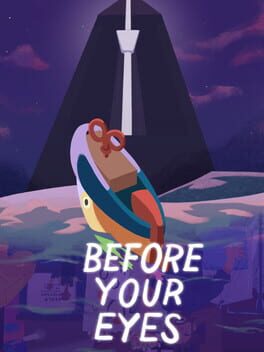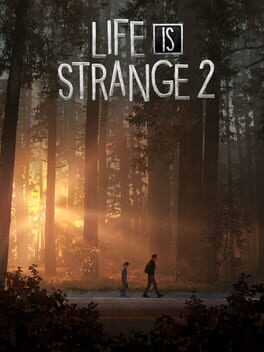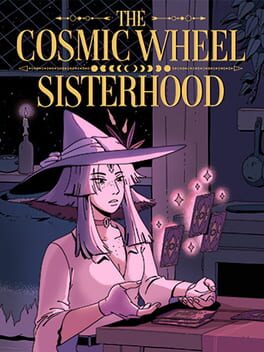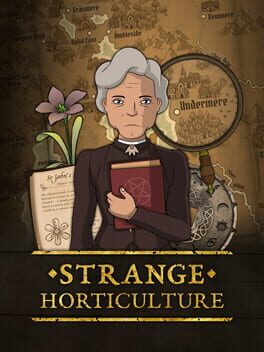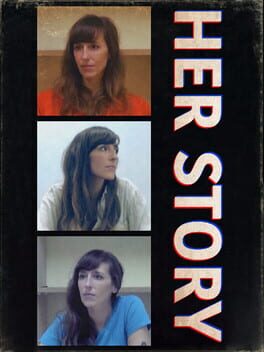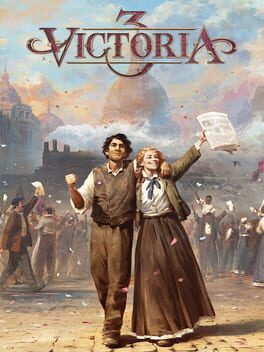Shymain
Bio
they/them
they/them
Badges

GOTY '23
Participated in the 2023 Game of the Year Event

1 Years of Service
Being part of the Backloggd community for 1 year

Loved
Gained 100+ total review likes

Well Written
Gained 10+ likes on a single review

Popular
Gained 15+ followers

Pinged
Mentioned by another user

Donor
Liked 50+ reviews / lists

Roadtrip
Voted for at least 3 features on the roadmap

GOTY '22
Participated in the 2022 Game of the Year Event

Gone Gold
Received 5+ likes on a review while featured on the front page

N00b
Played 100+ games

Best Friends
Become mutual friends with at least 3 others

Noticed
Gained 3+ followers

Liked
Gained 10+ total review likes
Favorite Games
219
Total Games Played
006
Played in 2024
029
Games Backloggd
Recently Played See More
Recently Reviewed See More
First, you created your world.
What should a game be? I've never been inside the room when a studio decides to make something new. It's not hard to imagine what it's like to have all the potential in the world in front of you, just waiting to be molded, but rarely is that the most accurate picture of what the creation of anything new on a significant scale looks like. Why would most developers bother asking what a game should be? What it is is set in stone from before they even began: It is a product, first and foremost. This doesn't preclude it being art, even great art—the two categories are not mutually exclusive, even if they are in tension with one another.
But when I sit down and play The Cosmic Wheel Sisterhood, it feels like everything about it was designed downstream of that one vital question of what a game should even be. I feel this way with Pentiment, with Heaven's Vault, with Strange Horticulture, Book of Hours, and Suzerain: It feels like I am standing on the edge of a new world, even while they are inescapably familiar and old in many ways. But so it is for anything new. Nothing springs out of the aether. These games and their designers recognize that what they are is written in their very essence—not merely their code, any more than our DNA is our essence exactly—and that we are the ones who write what that essence can be.
The Cosmic Wheel Sisterhood stuns with its structure. It loosely aligns itself into chapters and acts, following a linear path, but one that is hard to distinguish from the little splits in every direction flattened under the feet of those who were once lost here. That is to say: I had no idea where the game was taking me, but I was eager to follow and see what I could along the way. You build a deck that is not quite tarot. You read the cards for those you meet. You change the rhythm of fate. This is the main connective tissue of the game, but the game doesn't so much revolve around mechanics as it does around the ideas of fate and meaning. Halfway through the mechanical focus of the game completely pivots and you find yourself mired in a political race.
This prospect thrilled me. So often a world is constructed to draw limitations on a narrative when working with something this intimate in scope. It is the jailer: You cannot leave this single location, and the Lore justifies why that is. Here, the world is constructed to shatter the limitations that we are stuck with. If we are jailed, why is that, who enforces it, and how can we interact with the world nevertheless? The existence of the jailer and the jailing society are contained within the jail itself. The smallness of this game creates something that feels so expansive that when you look back at the end, it's hard to believe it's just been a couple hours.
Much of that, to me, is created precisely by the opacity of the game and its mechanics, similarly to many of the games I listed previously. I'll say it: I'm fucking tired of the fetishization of player agency, letting you do anything and go everywhere or whatever nonsense that idea has morphed into. I don't need games to be a world that I live in for exorbitant amounts of time. I love when games have totally inscrutable mechanics and some degree of randomness and lock you out of events and force you to just reckon with whatever decisions you made. Give me severe limitations in scope and options, just make it interesting. Have a vision, for god's sake!
And yet: The Cosmic Wheel Sisterhood's vision is of a world in which you truly construct your own meaning (which is a funny thing to say, given that meaning is perhaps the only pure act of creation that any of us engage in). It is all about agency. There's an idea here about playing the cards you're dealt by recognizing that you get to decide what the cards mean, despite the limitations of each card. But once you lay down the cards, the truth is decided. Fortuna writes reality.
Which is a funny tension, isn't it, the idea that agency is real and you decide what is, but then how could anyone else have agency when you simply write what is? How could even you have agency once you've read the cards? It's that delicious tension that lies at the heart of this game, time laid out flat so that the future and the past and the present are all just here at once when you shuffle your deck. I feel this tension most during the peak of the political campaign when a Cosmic Poet stops by to help you. Such a small thing and still we reach for the cards to generate the poem that we would have written even without the cards, skipping straight to the end that could not have been without all that we skipped over. They call it a paradoxical poem. It's beautiful:
First, you created your world. Waiting on the first beat of a new universe, you float, weightless, timeless, inside the potential of magic. This is what happens when you hold two mirrors together.
A piece of art is almost like a person. You see the fragmented experiential pieces of all that created them: the other. You see the thoughts lifted from your own head and reflected back at you: the self. You recognize the self inside the other and the other inside the self. I think I love this tension of agency undermining itself because ultimately, who gives a fuck? I don't care about whether I really have agency in a game. I just want it to be an almost-person, to be a mirror. I want us to bounce light back and forth between us until it fades away into reflected incoherence, fully subsumed into something new that we've created by staring into each others' abyss. I want it to create something new inside me that will fester and grow until it springs forth into something beautiful.
This is what happens when you hold two mirrors together: You create. The beginning was written in the end, and the end in the beginning. What difference is there, really, when time folds against itself upon the draw of a card?
At the end of the game, it turns out nothing you did really changes anything. It all collapses back into itself, into the fate which you wrote at the very beginning of the game. You were picking a card without realizing that is what you were doing. The strokes of reality had already been drawn from that very moment.
But in-between the strokes you found everything that matters.
What should a game be? I've never been inside the room when a studio decides to make something new. It's not hard to imagine what it's like to have all the potential in the world in front of you, just waiting to be molded, but rarely is that the most accurate picture of what the creation of anything new on a significant scale looks like. Why would most developers bother asking what a game should be? What it is is set in stone from before they even began: It is a product, first and foremost. This doesn't preclude it being art, even great art—the two categories are not mutually exclusive, even if they are in tension with one another.
But when I sit down and play The Cosmic Wheel Sisterhood, it feels like everything about it was designed downstream of that one vital question of what a game should even be. I feel this way with Pentiment, with Heaven's Vault, with Strange Horticulture, Book of Hours, and Suzerain: It feels like I am standing on the edge of a new world, even while they are inescapably familiar and old in many ways. But so it is for anything new. Nothing springs out of the aether. These games and their designers recognize that what they are is written in their very essence—not merely their code, any more than our DNA is our essence exactly—and that we are the ones who write what that essence can be.
The Cosmic Wheel Sisterhood stuns with its structure. It loosely aligns itself into chapters and acts, following a linear path, but one that is hard to distinguish from the little splits in every direction flattened under the feet of those who were once lost here. That is to say: I had no idea where the game was taking me, but I was eager to follow and see what I could along the way. You build a deck that is not quite tarot. You read the cards for those you meet. You change the rhythm of fate. This is the main connective tissue of the game, but the game doesn't so much revolve around mechanics as it does around the ideas of fate and meaning. Halfway through the mechanical focus of the game completely pivots and you find yourself mired in a political race.
This prospect thrilled me. So often a world is constructed to draw limitations on a narrative when working with something this intimate in scope. It is the jailer: You cannot leave this single location, and the Lore justifies why that is. Here, the world is constructed to shatter the limitations that we are stuck with. If we are jailed, why is that, who enforces it, and how can we interact with the world nevertheless? The existence of the jailer and the jailing society are contained within the jail itself. The smallness of this game creates something that feels so expansive that when you look back at the end, it's hard to believe it's just been a couple hours.
Much of that, to me, is created precisely by the opacity of the game and its mechanics, similarly to many of the games I listed previously. I'll say it: I'm fucking tired of the fetishization of player agency, letting you do anything and go everywhere or whatever nonsense that idea has morphed into. I don't need games to be a world that I live in for exorbitant amounts of time. I love when games have totally inscrutable mechanics and some degree of randomness and lock you out of events and force you to just reckon with whatever decisions you made. Give me severe limitations in scope and options, just make it interesting. Have a vision, for god's sake!
And yet: The Cosmic Wheel Sisterhood's vision is of a world in which you truly construct your own meaning (which is a funny thing to say, given that meaning is perhaps the only pure act of creation that any of us engage in). It is all about agency. There's an idea here about playing the cards you're dealt by recognizing that you get to decide what the cards mean, despite the limitations of each card. But once you lay down the cards, the truth is decided. Fortuna writes reality.
Which is a funny tension, isn't it, the idea that agency is real and you decide what is, but then how could anyone else have agency when you simply write what is? How could even you have agency once you've read the cards? It's that delicious tension that lies at the heart of this game, time laid out flat so that the future and the past and the present are all just here at once when you shuffle your deck. I feel this tension most during the peak of the political campaign when a Cosmic Poet stops by to help you. Such a small thing and still we reach for the cards to generate the poem that we would have written even without the cards, skipping straight to the end that could not have been without all that we skipped over. They call it a paradoxical poem. It's beautiful:
First, you created your world. Waiting on the first beat of a new universe, you float, weightless, timeless, inside the potential of magic. This is what happens when you hold two mirrors together.
A piece of art is almost like a person. You see the fragmented experiential pieces of all that created them: the other. You see the thoughts lifted from your own head and reflected back at you: the self. You recognize the self inside the other and the other inside the self. I think I love this tension of agency undermining itself because ultimately, who gives a fuck? I don't care about whether I really have agency in a game. I just want it to be an almost-person, to be a mirror. I want us to bounce light back and forth between us until it fades away into reflected incoherence, fully subsumed into something new that we've created by staring into each others' abyss. I want it to create something new inside me that will fester and grow until it springs forth into something beautiful.
This is what happens when you hold two mirrors together: You create. The beginning was written in the end, and the end in the beginning. What difference is there, really, when time folds against itself upon the draw of a card?
At the end of the game, it turns out nothing you did really changes anything. It all collapses back into itself, into the fate which you wrote at the very beginning of the game. You were picking a card without realizing that is what you were doing. The strokes of reality had already been drawn from that very moment.
But in-between the strokes you found everything that matters.
there's a point halfway through where you realize a lot of what you assumed was just humor because of the satirical tone of the writing was just the game saying what it meant. like, okay, let's examine the white supremacy shit: there is no route where the text is "hell yeah we love white supremacy it rocks!" and the joke is that this is a stupid text. the text itself is instead very explicit about how this is an abhorrent and violent ideology which even treating with apathy is wrong. the joke is, holy shit isn't it fucked up that we're just kinda describing the real world at you? people believe this and act like this?
so then there is no reason to believe that the rest of what this game is saying on the surface level is any less sincere and straightforward. and man it has some powerful shit to say at times, i'll be honest. some parts toward the end of my playthrough had a fairly strong emotional impact. feminist kino.
so then there is no reason to believe that the rest of what this game is saying on the surface level is any less sincere and straightforward. and man it has some powerful shit to say at times, i'll be honest. some parts toward the end of my playthrough had a fairly strong emotional impact. feminist kino.
I asked for a whirling, living, breathing machine, and she gave me the hell I most desired.
Economics is kinda bullshit, okay? I’m a communist, plenty of you fuckers are communists, we’re obligated to believe that if nothing else. But wouldn’t it kinda be neat if economics had something to it, if everything was just supply and demand at various levels of scale, if you could feel the veins within the invisible hand of the market and twist them in any way you liked? Fundamentally, this is what Victoria 3 offers the player: You get to build an economy and make it run so goddamn good that you launch your country’s standard of living into the stratosphere.
The process of industrialization is the beating metal heart of this game. It starts, if you are a weak enough power, at the most basic level: You set up logging camps, use the wood you produce to build tools, use those tools in your logging camps to increase productivity, start mining iron with the tools you built, increase the efficiency of tools using that iron, and on and on it goes. It’s all very straightforward in a line by line description, but fails entirely to capture the dynamic energy that sets this apart from other grand strategy games like it. That energy comes from the populations. You’ll hear this come up whenever people discuss Victoria as a series: It’s all about population management. You want to meet their material needs, provide them with jobs, track what classes of society they come from and who you are empowering, so on and so forth. It’s all about the populations.
But there’s almost a sense that management is the wrong word entirely—left alone, your populations manage themselves. They’ll work on subsistence farms and provide their own needs, and everything will stay at a relatively good equilibrium unless a greater power swoops by and annexes your entire country out of the blue. Whoops! There’s a very real pressure to be better, be stronger, be more capable of resisting imperial powers, and this can only be managed with a directed vision. Pure reaction will never be enough. This is why resistance movements and rebellions in the real world do not merely dissolve once they have achieved their immediate goals—dissolution of the state creates a power vacuum that is just asking to be filled. (Vincent Bevins writes about this phenomena at length in relation to modern mass movements in his excellent new book If We Burn, as a side note. Please read it!)
No, management implies that you are creating from the ground up the forces of society. But these forces arise naturally—they are a structure inherent to any group of people interacting at scale, though they may manifest in different modes. Our role is not to create, but to direct as best we can the immense forces that we already possess. This is the feeling you have when your country begins to industrialize and you see the basic production you had at first start to swirl in self-powering feedback loops, profits seemingly arising from nowhere by the sheer nature of the movement of money between industry and consumer and government. There is no better feeling than when you painstakingly direct the production methods of each factory and construction company and mine, one by one transitioning to the new tools you have access to, causing your country’s productive capacity to explode exponentially, only ever growing bigger and bigger. Your standard of living increases, industrialists and the petite bourgeoisie grow more powerful, and demand more and more—
And so you become a monster, lost to pure momentum.
My favorite thing to do in this game is to play as marginalized and minor powers across the world. It’s incredibly satisfying to do that initial work of building something from nothing. With the way that this game encourages you to think about populations at all times, it almost feels tangible how many people you are pulling out of poverty. But with smaller nations, there’s always a ceiling. This takes one of two forms: resource shortages, or population shortages. The first of these is not such a big deal—this is what trade fundamentally solves. Sometimes you have way too much iron and need more oil. The solution presents itself. But population shortages? If you run into these, you’re fucked.
See, this machine of pure human and industrial momentum is always stealing just a little bit from the future. The process of industrialization is a challenge to outrun the consequences which you necessitate by engaging in industrialization. Your profits come from constant expansion and growth. Your citizens are happier when you are doing more, cutting down more trees, mining more iron, squeezing every last drop of steel out of the resources you have. But what if there is no expansion left in the interior? You can’t build any more factories, you don’t have people to work in them! In fact, given how much of your economy depends on the construction sector, you'll even start to implode, unable to sufficiently create demand for all the goods you've been producing, if you're unable to keep building. How can you continue to compete? If you don’t compete with the global market, they will overtake you, grow more powerful, be able to raise a greater army, and then you will be back where you started—just a minor power swept away by the colonizers and conquerers that surround you. What can you do when you don’t have any of your future left to steal from? You steal it from someone else.
This is the enticing trap of colonialism, for once your country tastes the labor, the goods, the blood of one colony, they will never be satisfied. Interest groups are often a mechanic that feels a little half-baked and oversimplified, but on this point they feel fundamentally correct: Basically no group within a colonial power opposes colonization. It’s just objectively profitable for them, when the world is filtered through this lens of economics to such an extent that all is consumed by it. Even when your society has more than anyone else in the world, they still desire to just consume more and more and more. I’d almost say this game is cynical if it wasn’t so fucking on point. When the world is all an abstract map of economic affairs, the desire to paint your color across the world is almost natural. For a moment, I understand how we got to where we are.
But then I zoom in on the world and it comes alive, and I can understand no longer.
- - -
A post-script as thanks for reading:
I find recently that most of my media analysis tends to find itself drawn magnetically to human nature as a concept in one way or another. Sometimes it's an obvious connection, like Killers of the Flower Moon, and sometimes it's a little more obtuse, as with this review. But even here we made the connection at the end: "the desire to paint your color across the world is almost natural." I think this actually comes full circle to the comment I made about economics being bullshit at the beginning of the review, a connection which I'll explore in a moment. I think it's probably a very important idea to focus on because it seems to deeply underpin basically all of how we understand the world, and I think we don't get to the center of that nearly often enough. How can you deconstruct an ideology without understanding its foundations?
There's this pretty fundamental assertion that every regressive, conservative, etc. etc. likes to make in their art, which is that on some level This Is Just How Things Are, which always takes the form of telling us that some particular tendency is just part of human nature. Isn't it just so convenient that those who did horrific evil in order to claw their way to the top of hegemony, and who continue to employ great violence at their behest in order to maintain that power, didn't really do anything bad because if everyone does something how can it really be bad? It's a deeply false but psychologically necessary claim: That the evil I do is not evil, and you would have done it too if you were me.
It's the same reduction that is made to turn humans into economic machines—understanding us simply as a set of material inputs and outputs who consume and produce things. It's a claim that if you had the same material conditions, you would necessarily do the same thing. But this denies the "you" in you, doesn't it? Think about yourself for a moment. Find where "you" are, the consciousness and the observer of the consciousness, whatever that means to you. How is this amorphous primal beast of a thing reducible to deterministic inputs and outputs? Do you really believe that? This is merely an assertion of their axioms of truth onto yours, a refusal to negotiate reality with you but instead an insistence of their own experience, a complete and utter denial of the real of the subjective, of the concept of a You! It is the ultimate solipsism, the greatest sin, the making of man into machine with a computerized brain, the ooze of capital left behind in the creases of everyone's brain from its utter hegemonic power in the ideological realm.
All of which is why I say that economics (or rather, the mainstream capitalist understanding of economics) is bullshit—it is a fundamental reduction of humans to being consumers and producers, and that can never meaningfully capture the picture of any social structure that emerges from how we interact with one another. You've gotta look elsewhere to understand that. It's stuck too deep in the realm of asserting its own axioms, that great circular reasoning, to hold any real truth. It's fundamentally inflexible and immobile in a way that the absolute reality of what we call a political economy can never be reduced to.
Victoria 3 captures all of this incredibly concretely, a little glimpse of the irreducibility behind economy, the first of the shapes in its stages of dialectical development on the way to understanding what that irreducibility even is. It's an astounding achievement, even if it is limited at times by the boundaries of its understanding and imagination.
Economics is kinda bullshit, okay? I’m a communist, plenty of you fuckers are communists, we’re obligated to believe that if nothing else. But wouldn’t it kinda be neat if economics had something to it, if everything was just supply and demand at various levels of scale, if you could feel the veins within the invisible hand of the market and twist them in any way you liked? Fundamentally, this is what Victoria 3 offers the player: You get to build an economy and make it run so goddamn good that you launch your country’s standard of living into the stratosphere.
The process of industrialization is the beating metal heart of this game. It starts, if you are a weak enough power, at the most basic level: You set up logging camps, use the wood you produce to build tools, use those tools in your logging camps to increase productivity, start mining iron with the tools you built, increase the efficiency of tools using that iron, and on and on it goes. It’s all very straightforward in a line by line description, but fails entirely to capture the dynamic energy that sets this apart from other grand strategy games like it. That energy comes from the populations. You’ll hear this come up whenever people discuss Victoria as a series: It’s all about population management. You want to meet their material needs, provide them with jobs, track what classes of society they come from and who you are empowering, so on and so forth. It’s all about the populations.
But there’s almost a sense that management is the wrong word entirely—left alone, your populations manage themselves. They’ll work on subsistence farms and provide their own needs, and everything will stay at a relatively good equilibrium unless a greater power swoops by and annexes your entire country out of the blue. Whoops! There’s a very real pressure to be better, be stronger, be more capable of resisting imperial powers, and this can only be managed with a directed vision. Pure reaction will never be enough. This is why resistance movements and rebellions in the real world do not merely dissolve once they have achieved their immediate goals—dissolution of the state creates a power vacuum that is just asking to be filled. (Vincent Bevins writes about this phenomena at length in relation to modern mass movements in his excellent new book If We Burn, as a side note. Please read it!)
No, management implies that you are creating from the ground up the forces of society. But these forces arise naturally—they are a structure inherent to any group of people interacting at scale, though they may manifest in different modes. Our role is not to create, but to direct as best we can the immense forces that we already possess. This is the feeling you have when your country begins to industrialize and you see the basic production you had at first start to swirl in self-powering feedback loops, profits seemingly arising from nowhere by the sheer nature of the movement of money between industry and consumer and government. There is no better feeling than when you painstakingly direct the production methods of each factory and construction company and mine, one by one transitioning to the new tools you have access to, causing your country’s productive capacity to explode exponentially, only ever growing bigger and bigger. Your standard of living increases, industrialists and the petite bourgeoisie grow more powerful, and demand more and more—
And so you become a monster, lost to pure momentum.
My favorite thing to do in this game is to play as marginalized and minor powers across the world. It’s incredibly satisfying to do that initial work of building something from nothing. With the way that this game encourages you to think about populations at all times, it almost feels tangible how many people you are pulling out of poverty. But with smaller nations, there’s always a ceiling. This takes one of two forms: resource shortages, or population shortages. The first of these is not such a big deal—this is what trade fundamentally solves. Sometimes you have way too much iron and need more oil. The solution presents itself. But population shortages? If you run into these, you’re fucked.
See, this machine of pure human and industrial momentum is always stealing just a little bit from the future. The process of industrialization is a challenge to outrun the consequences which you necessitate by engaging in industrialization. Your profits come from constant expansion and growth. Your citizens are happier when you are doing more, cutting down more trees, mining more iron, squeezing every last drop of steel out of the resources you have. But what if there is no expansion left in the interior? You can’t build any more factories, you don’t have people to work in them! In fact, given how much of your economy depends on the construction sector, you'll even start to implode, unable to sufficiently create demand for all the goods you've been producing, if you're unable to keep building. How can you continue to compete? If you don’t compete with the global market, they will overtake you, grow more powerful, be able to raise a greater army, and then you will be back where you started—just a minor power swept away by the colonizers and conquerers that surround you. What can you do when you don’t have any of your future left to steal from? You steal it from someone else.
This is the enticing trap of colonialism, for once your country tastes the labor, the goods, the blood of one colony, they will never be satisfied. Interest groups are often a mechanic that feels a little half-baked and oversimplified, but on this point they feel fundamentally correct: Basically no group within a colonial power opposes colonization. It’s just objectively profitable for them, when the world is filtered through this lens of economics to such an extent that all is consumed by it. Even when your society has more than anyone else in the world, they still desire to just consume more and more and more. I’d almost say this game is cynical if it wasn’t so fucking on point. When the world is all an abstract map of economic affairs, the desire to paint your color across the world is almost natural. For a moment, I understand how we got to where we are.
But then I zoom in on the world and it comes alive, and I can understand no longer.
- - -
A post-script as thanks for reading:
I find recently that most of my media analysis tends to find itself drawn magnetically to human nature as a concept in one way or another. Sometimes it's an obvious connection, like Killers of the Flower Moon, and sometimes it's a little more obtuse, as with this review. But even here we made the connection at the end: "the desire to paint your color across the world is almost natural." I think this actually comes full circle to the comment I made about economics being bullshit at the beginning of the review, a connection which I'll explore in a moment. I think it's probably a very important idea to focus on because it seems to deeply underpin basically all of how we understand the world, and I think we don't get to the center of that nearly often enough. How can you deconstruct an ideology without understanding its foundations?
There's this pretty fundamental assertion that every regressive, conservative, etc. etc. likes to make in their art, which is that on some level This Is Just How Things Are, which always takes the form of telling us that some particular tendency is just part of human nature. Isn't it just so convenient that those who did horrific evil in order to claw their way to the top of hegemony, and who continue to employ great violence at their behest in order to maintain that power, didn't really do anything bad because if everyone does something how can it really be bad? It's a deeply false but psychologically necessary claim: That the evil I do is not evil, and you would have done it too if you were me.
It's the same reduction that is made to turn humans into economic machines—understanding us simply as a set of material inputs and outputs who consume and produce things. It's a claim that if you had the same material conditions, you would necessarily do the same thing. But this denies the "you" in you, doesn't it? Think about yourself for a moment. Find where "you" are, the consciousness and the observer of the consciousness, whatever that means to you. How is this amorphous primal beast of a thing reducible to deterministic inputs and outputs? Do you really believe that? This is merely an assertion of their axioms of truth onto yours, a refusal to negotiate reality with you but instead an insistence of their own experience, a complete and utter denial of the real of the subjective, of the concept of a You! It is the ultimate solipsism, the greatest sin, the making of man into machine with a computerized brain, the ooze of capital left behind in the creases of everyone's brain from its utter hegemonic power in the ideological realm.
All of which is why I say that economics (or rather, the mainstream capitalist understanding of economics) is bullshit—it is a fundamental reduction of humans to being consumers and producers, and that can never meaningfully capture the picture of any social structure that emerges from how we interact with one another. You've gotta look elsewhere to understand that. It's stuck too deep in the realm of asserting its own axioms, that great circular reasoning, to hold any real truth. It's fundamentally inflexible and immobile in a way that the absolute reality of what we call a political economy can never be reduced to.
Victoria 3 captures all of this incredibly concretely, a little glimpse of the irreducibility behind economy, the first of the shapes in its stages of dialectical development on the way to understanding what that irreducibility even is. It's an astounding achievement, even if it is limited at times by the boundaries of its understanding and imagination.
